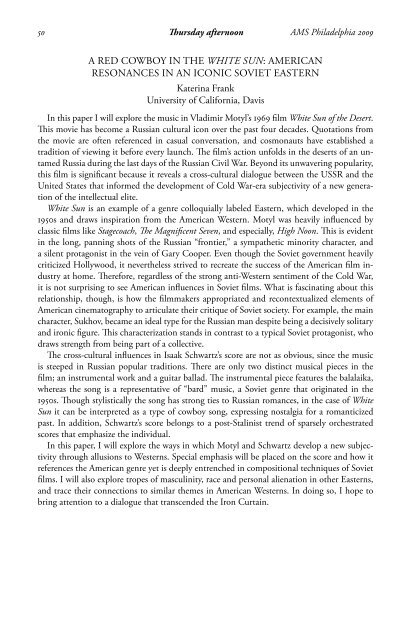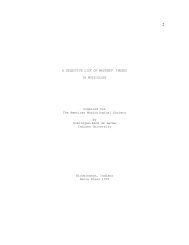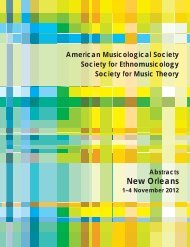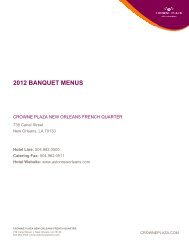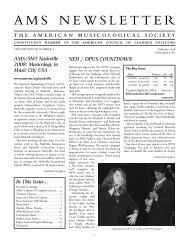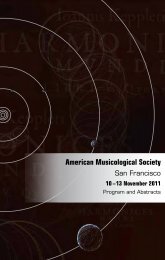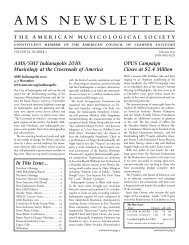AMS Philadelphia 2009 Abstracts - American Musicological Society
AMS Philadelphia 2009 Abstracts - American Musicological Society
AMS Philadelphia 2009 Abstracts - American Musicological Society
Create successful ePaper yourself
Turn your PDF publications into a flip-book with our unique Google optimized e-Paper software.
50 Thursday afternoon <strong>AMS</strong> <strong>Philadelphia</strong> <strong>2009</strong><br />
A RED COWBOY IN THE WHite SUN: AMERICAN<br />
RESONANCES IN AN ICONIC SOVIET EASTERN<br />
Katerina Frank<br />
University of California, Davis<br />
In this paper I will explore the music in Vladimir Motyl’s 1969 film White Sun of the desert.<br />
This movie has become a Russian cultural icon over the past four decades. Quotations from<br />
the movie are often referenced in casual conversation, and cosmonauts have established a<br />
tradition of viewing it before every launch. The film’s action unfolds in the deserts of an untamed<br />
Russia during the last days of the Russian Civil War. Beyond its unwavering popularity,<br />
this film is significant because it reveals a cross-cultural dialogue between the USSR and the<br />
United States that informed the development of Cold War-era subjectivity of a new generation<br />
of the intellectual elite.<br />
White Sun is an example of a genre colloquially labeled Eastern, which developed in the<br />
1950s and draws inspiration from the <strong>American</strong> Western. Motyl was heavily influenced by<br />
classic films like Stagecoach, The Magnificent Seven, and especially, High Noon. This is evident<br />
in the long, panning shots of the Russian “frontier,” a sympathetic minority character, and<br />
a silent protagonist in the vein of Gary Cooper. Even though the Soviet government heavily<br />
criticized Hollywood, it nevertheless strived to recreate the success of the <strong>American</strong> film industry<br />
at home. Therefore, regardless of the strong anti-Western sentiment of the Cold War,<br />
it is not surprising to see <strong>American</strong> influences in Soviet films. What is fascinating about this<br />
relationship, though, is how the filmmakers appropriated and recontextualized elements of<br />
<strong>American</strong> cinematography to articulate their critique of Soviet society. For example, the main<br />
character, Sukhov, became an ideal type for the Russian man despite being a decisively solitary<br />
and ironic figure. This characterization stands in contrast to a typical Soviet protagonist, who<br />
draws strength from being part of a collective.<br />
The cross-cultural influences in Isaak Schwartz’s score are not as obvious, since the music<br />
is steeped in Russian popular traditions. There are only two distinct musical pieces in the<br />
film; an instrumental work and a guitar ballad. The instrumental piece features the balalaika,<br />
whereas the song is a representative of “bard” music, a Soviet genre that originated in the<br />
1950s. Though stylistically the song has strong ties to Russian romances, in the case of White<br />
Sun it can be interpreted as a type of cowboy song, expressing nostalgia for a romanticized<br />
past. In addition, Schwartz’s score belongs to a post-Stalinist trend of sparsely orchestrated<br />
scores that emphasize the individual.<br />
In this paper, I will explore the ways in which Motyl and Schwartz develop a new subjectivity<br />
through allusions to Westerns. Special emphasis will be placed on the score and how it<br />
references the <strong>American</strong> genre yet is deeply entrenched in compositional techniques of Soviet<br />
films. I will also explore tropes of masculinity, race and personal alienation in other Easterns,<br />
and trace their connections to similar themes in <strong>American</strong> Westerns. In doing so, I hope to<br />
bring attention to a dialogue that transcended the Iron Curtain.


